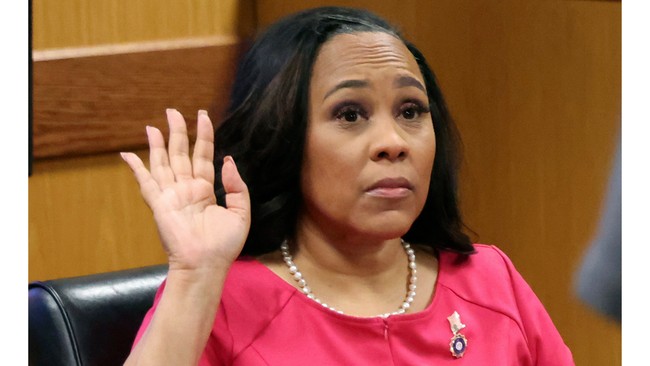
Donald Trump’s legal team had a bombshell in its back pocket after all. In a new filing in the Fani Willis disqualification motions, cellphone records demonstrate that Willis and Nathan Wade’s close relationship started before she hired him as the special prosecutor for the RICO case against Trump et al. And if this data can be substantiated, it could set up both lawyers for perjury charges and disbarment.
The Atlanta Journal-Constitution proclaims this a very big deal:
Nathan Wade appeared to make at least 35 visits to the Hapeville neighborhood where Fani Willis was living before the district attorney hired him to lead Fulton County’s election interference prosecution, according to cellphone data included in a court submission filed Friday. …
Trump’s lawyers relied on data collected from Wade’s cellphone and cellphone tower transmissions to track his movements. It seems to contradict Wade’s testimony last week in which he said he had visited Willis at her condo in Hapeville no more than 10 times before he was hired in November 2021. It also indicates Wade twice arrived late at night at the condo and left early the next morning in the months before Willis and Wade said their relationship became romantic early in 2022.
Both Wade and Willis testified last week that they did not spend the night together at the Hapeville condo.
How did they get this data, and is it reliable? The filing explains that the defense team subpoenaed AT&T to get the data, and it’s remarkable. In court, Wade was somewhat ambiguous and evasive when asked when their sexual relationship started, but Willis was far more direct. She insisted that they had a collegial relationship and nothing more prior to November 2021, when she hired Wade, and that they had never spent any extended time together. Willis specifically denied that Wade had ever stayed overnight anywhere she resided until after his hiring and his filing for divorce, which happened within 24 hours of each other.
What do the records show? Ahem:
The affidavit says Willis and Wade called each other more than 2,000 times during the first 11 months of 2021 and exchanged just less than 12,000 text messages.
Two thousand calls? Over a period of 334 days, that averages out to six calls a day. Add to that an average of 36 texts a day, and you don’t just have a relationship; you have an obsession. This more resembles a high-school crush than an adult romance, or perhaps more like … a RICO conspiracy.
The AJC offers an anodyne explanation of why this looks super-bad:
The timeline is important for two reasons. If Willis and Wade were a couple before she hired him it raises the prospect that she may have violated at least the spirit of anti-nepotism rules, though Fulton’s policy specifically focuses on family members. More importantly, both Willis and Wade have testified under oath that the relationship began in 2022. If defense attorneys can prove that they lied under oath it could constitute perjury.
First off, no one’s worried about the “anti-nepotism” rules. The issue that initially prompted the disqualification motion was the $650,000 Willis paid Wade in legal fees and the personal benefit she received from it when Wade paid her travel expenses in a series of pricey vacations. Willis (and Wade) attempted to parry this issue by claiming that Willis repaid him in cash for those outlays out of her vast cash reserves at home, hoping that would convince the judge to shrug it off. However, Wade and especially Willis also testified in person and in affidavits that they didn’t have a romantic relationship before Willis hired Wade, hoping to rebut the allegation that the RICO prosecution was a vehicle for shoveling cash to Willis’ boyfriend.
Now both Wade and Willis have a much bigger danger in front of them. It’s clear that they testified falsely about the nature of their relationship in the hearing last week. That’s perjury, and it’s not just disqualifying for this case, but disqualifying as attorneys forever. It’s also a felony punishable by several years in prison. And even if prosecutors take a pass, this will force the Georgia State Bar to take some sort of action to prevent attorneys who commit or suborn perjury from practicing law in their state.
And now we can figure out what Terrence Bradley knew that Wade was trying to keep quiet by invoking attorney-client privilege.
This rests with Judge Scott McAfee now. The records and the preferred testimony of the investigator who got them and provided the analysis has removed any ambiguity about the situation. McAfee seems to have little choice but to remove both Willis and Fulton County from this case on the basis of misconduct in court, at least. He will likely have to refer the entire matter to the state attorney general with this new evidence. I wonder whether he’ll wait for next week to do so — and whether Willis and Wade belatedly attempt to withdraw first, which they should have done weeks ago.
